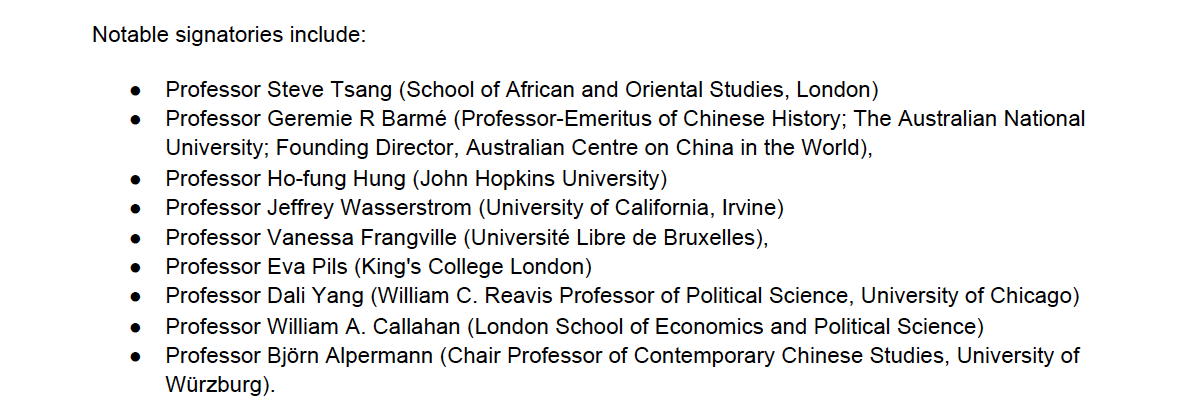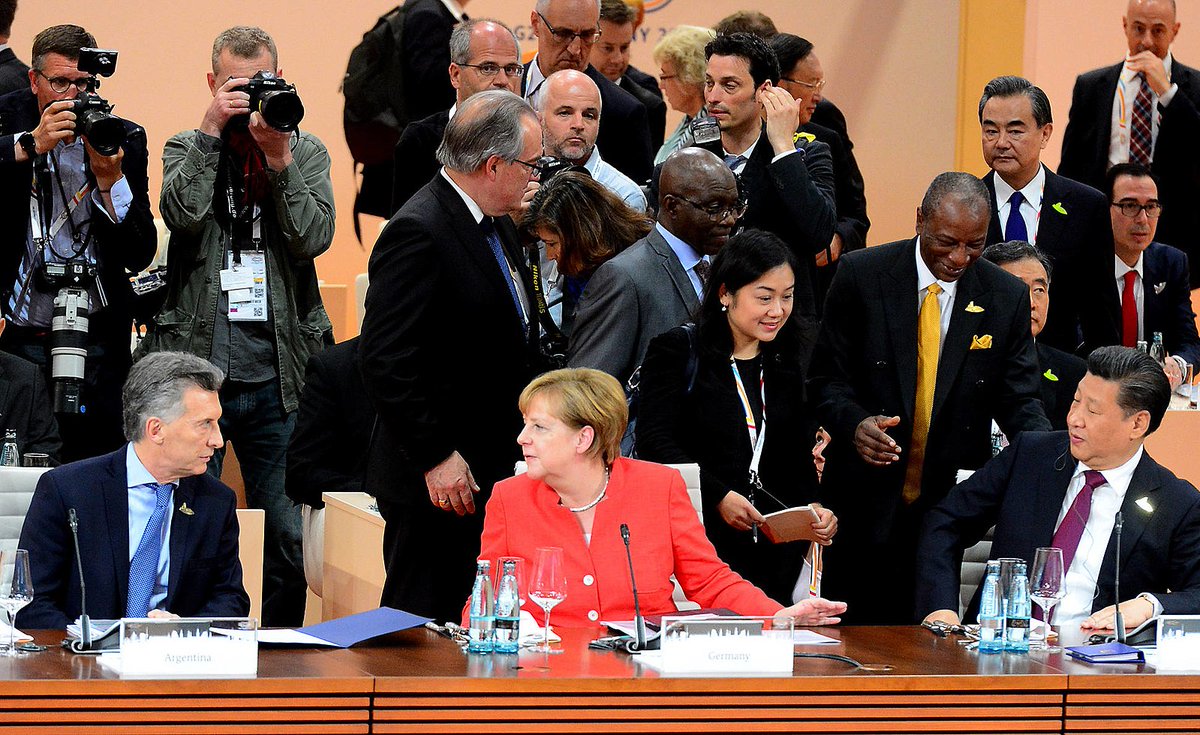
🔶 BREAKING 🔶
Over 100 leading scholars have called for a united front in defence of academic freedoms amid increasing pressure from the Chinese government since the passing of Hong Kong’s National Security Law. 1/32
theguardian.com/education/2020…
Over 100 leading scholars have called for a united front in defence of academic freedoms amid increasing pressure from the Chinese government since the passing of Hong Kong’s National Security Law. 1/32
theguardian.com/education/2020…
The group of international signatories includes some of the world’s leading authorities on Chinese politics, law, and modern history. The statement notes that the universal jurisdiction claimed by Article 38 of the National Security Law ... 2/32
... raises the unsettling prospect of students travelling through Hong Kong and China facing the possibility of being handed lengthy prison sentences on the basis of academic work deemed to be ‘subversive’ by Chinese authorities. 3/32
The signatories cite reports that China related modules are being dropped and writings ‘self censored’ by students out of fear of future reprisals. 4/32
Addressing US Ivy League Schools, the Russell Group of 24 leading British universities, as well as their counterparts in Europe, Australia and New Zealand, the signatories demand an unequivocal condemnation of the National Security Law, or risk supporting it implicitly. 5/32
In a plea to international lawmakers, the signatories called for legislation to be updated to create a university environment fit for the full exercise of academic freedom, and for governments to raise these concerns with their Chinese counterparts. 6/32
The statement marks a decisive pushback of academics who feel threatened by the overreach of China's censorship regime, and represents a broader concern at the increasing threat to academic freedom from the Chinese Communist Party. 8/32
Disclaimer: I am grateful to @liu_dimon who kindly invited me to write draft zero of the joint statement. I would also like to thank @donaldcclarke and @Johnny_HKWatch for their wise counsel during subsequent revisions of the text, which is now owned by all co-signatories. 9/32 

🔸JOINT STATEMENT🔸
"The recently introduced Hong Kong National Security Law is a direct assault on academic freedom by the Chinese party-state." 10/32
"The recently introduced Hong Kong National Security Law is a direct assault on academic freedom by the Chinese party-state." 10/32
"Universities are supposed to be a place for vigorous debate, and to offer a safe space for staff and students to discuss contentious issues without fear or favour." 11/32
"The National Security Law, which under Article 38 is global in its scope and application, will compromise freedom of speech and academic autonomy, creating a chilling effect and encouraging critics of the Chinese party-state to self-censor." 12/32
"The Chinese party-state itself has confirmed this far-reaching interpretation, most recently in a statement from the Chinese Embassy in the United Kingdom asserting that burning the People's Republic of China (PR China) national flag" ... 14/32
"... and chanting slogans in London constituted a violation of both the PR China's National Flag Law and the National Security Law." 15/32
scmp.com/news/hong-kong…
scmp.com/news/hong-kong…
"Attempts are now under way to safeguard students in China-related courses. Some universities now allow students to submit their coursework anonymously." 17/32
chinafile.com/reporting-opin…
chinafile.com/reporting-opin…
"Oxford University has announced that 'group tutorials are to be replaced by one-to-ones'. But such stop-gap measures are insufficient ..." 18/32
theguardian.com/education/2020…
theguardian.com/education/2020…
"... to address the underlying concern that staff and students may be reported for what they say in class, whether it is online or offline." 19/32
rfa.org/cantonese/news…
rfa.org/cantonese/news…
"These concerns are well founded. It is widely known that the Chinese party-state is weaponising students to monitor their university instructors in mainland China and Hong Kong." 20/32
economist.com/china/2020/08/…
economist.com/china/2020/08/…
"Such attempts to instrumentalise students do not stop at the PR China's border. Professor Vanessa Frangville has revealed that the Chinese embassy in Brussels tried to hire Brussels campus students ..." 21/32
plus.lesoir.be/328813/article…
plus.lesoir.be/328813/article…
"... to express their disapproval of a Uyghur demonstration in 2018. And a lecturer in Sinology at the University of Leipzig recently told Hong Kong activist Glacier Kwong that:" 22/32 

"This example is typical of a wider trend which may result in global censorship." 23/32
hk.appledaily.com/opinion/202010…
hk.appledaily.com/opinion/202010…
"Universities cannot be expected to resolve the problem alone. The measures proposed by Oxford University are unrealistic for most universities; ..." 24/32
"... online services which check student submissions for plagiarism are vulnerable to cyber-attacks; and mere suspicion that staff and students could be reported to the Chinese authorities already has a chilling effect." 25/32
"What is needed is a united front of university leaders and academics, Members of Parliament, and senior government officials to act in defence of academic autonomy and freedom of speech." 26/32
"US Ivy League Schools, the Russell Group of 24 leading British universities, as well as their counterparts in Europe, Australia and New Zealand, must unequivocally condemn the law." 27/32
"If universities fail to condemn the law explicitly, then they are supporting it implicitly. As BACS has rightly pointed out," 28/32 

"International lawmakers and senior government officials must take steps to ensure legislation is updated to create a university environment which enables the full exercise of academic freedom." 29/32
"They should reiterate to Chinese authorities that Article 38 of the Hong Kong National Security Law is unacceptable and makes an open-ended intercultural dialogue with the PR China increasingly difficult." 30/32
"It codifies the illiberal values of the Chinese Communist Party, such as the Seven Don't Speaks and Document No 9." 31/32
chinafile.com/document-9-chi…
chinafile.com/document-9-chi…
"Such political censorship is antithetical to the pursuit of knowledge and understanding. It also prevents a critical discussion about the PR China and its role in the world." /STATEMENT ENDS
If you are an academic and would like to support the joint statement "The Hong Kong National Security Law is an assault on academic freedom" you can co-sign the open letter here:
docs.google.com/forms/d/e/1FAI…
docs.google.com/forms/d/e/1FAI…
• • •
Missing some Tweet in this thread? You can try to
force a refresh










